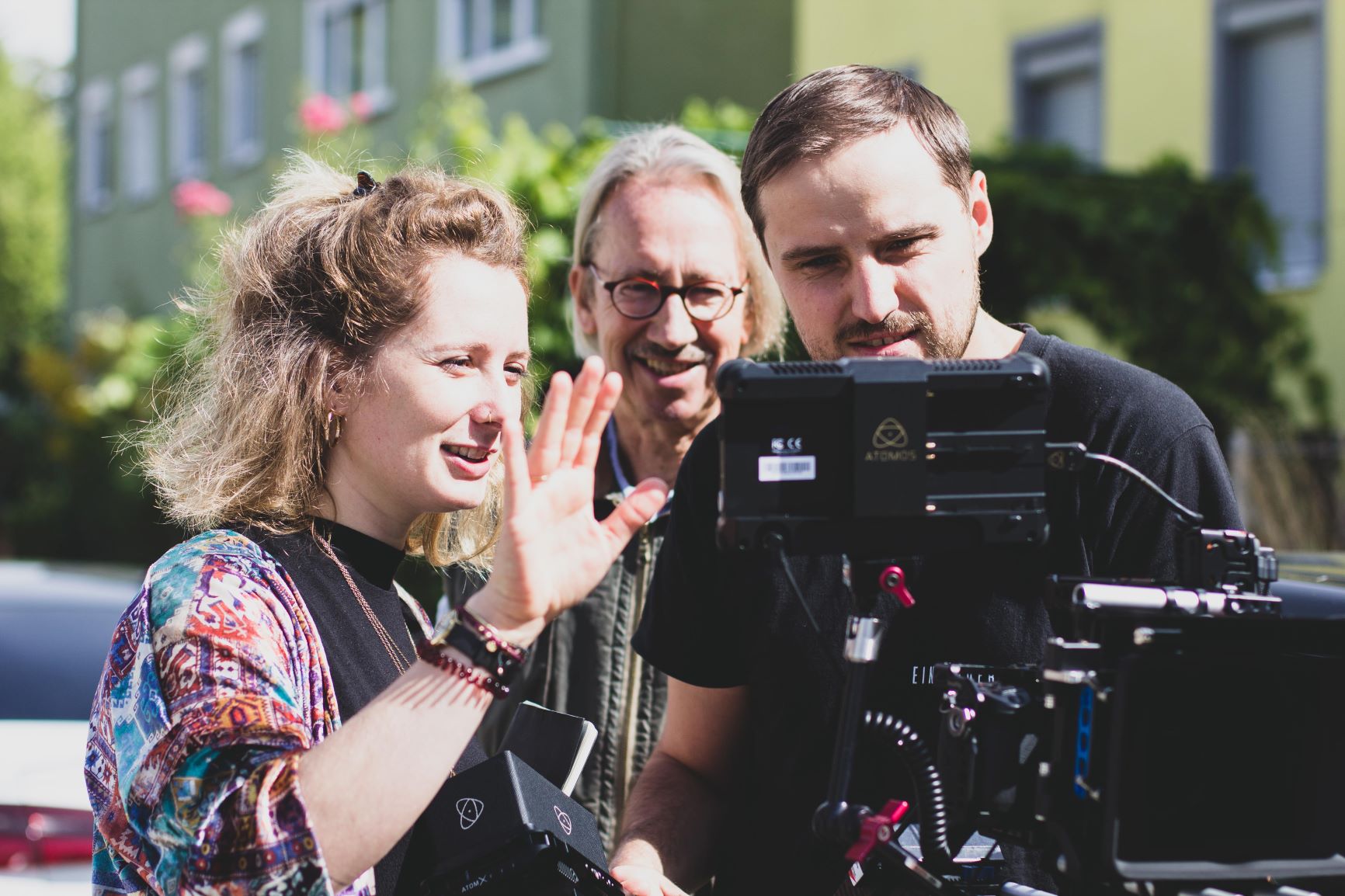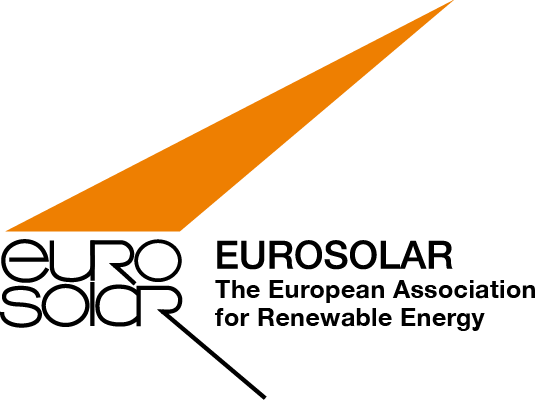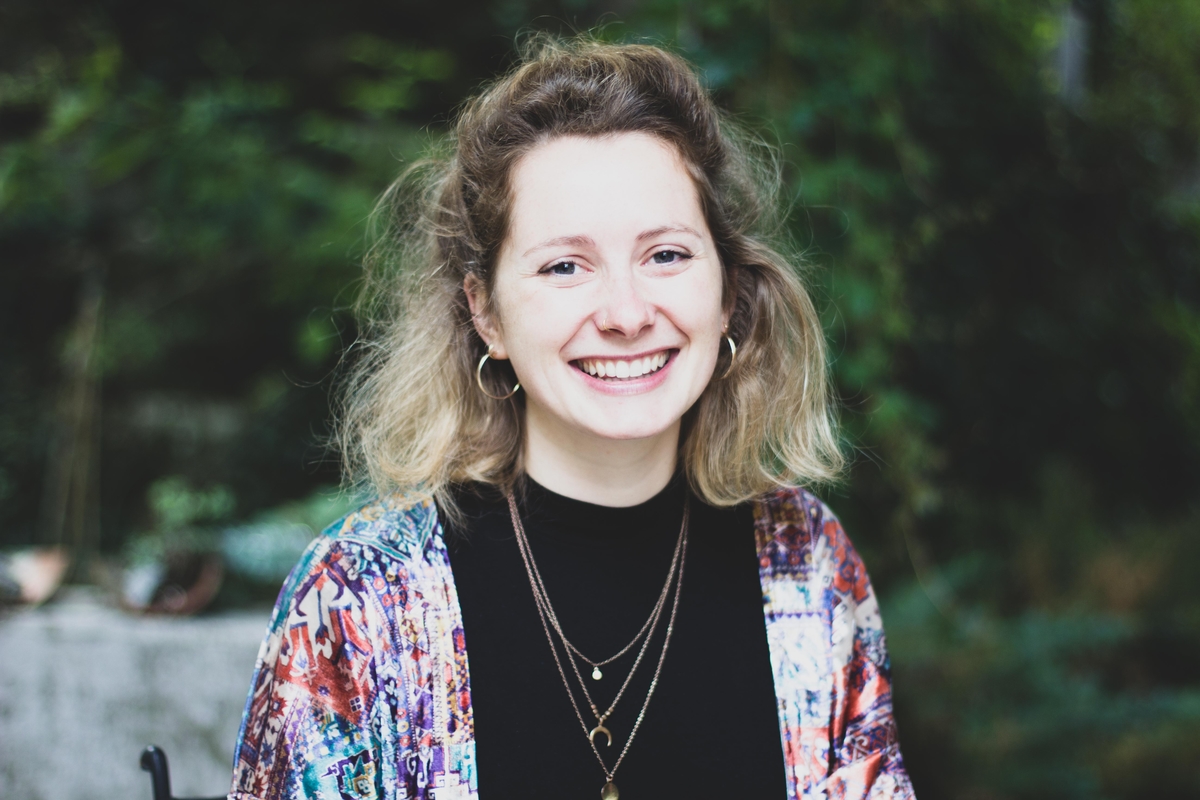Johanna Jaurich (27) works as a director, producer and writer for sustainable documentaries at the German film company fechnerMEDIA. In this interview, you will learn what drives the EUROSOLAR award winner, what impact her films have, what role renewable energies play in her life, as well as why we are in a deep crisis of feeling and how we can get out of it. The filmmaker also gives personal insights into her new global impact film project THE STORY OF A NEW WORLD, on which she is working together with renowned director Carl-A. Fechner, and finally has a few exclusive tips for aspiring filmmakers that have helped her find her way.
EUROSOLAR TIMES: Johanna, your latest work has received a lot of positive attention and was awarded the EU European Solar Prize. But how did you get into filmmaking in the first place?
Johanna Jaurich: I have been interested in filmmaking and sustainability since I was young. In my studies (media studies), I ap-proached the topic froma scientific perspec-tive, until I finally realized that I wanted to tell stories not about but rather with films myself. So, I gained experiences in various student and freelance film projects and at Greenpeace in the video department, until my path finally led me to the sustainable film production company fechnerMEDIA, where I have been working as a writer, di-rector and producer since 2017. I feel very lucky and privileged to be able to combine my two passions for sustainability and filmmaking in such a wonderful way.
EUROSOLAR TIMES: Sustainability is a common thread throughout your work. What do renewables mean to you and your work as a director?
Johanna Jaurich: Constructive stories about sustainable issues inspire me tre-mendously – and that’s why I’m telling such stories in my work as well. It has been proven that a key factor for sustain-able change is the transition of the global energy supply to renewable energies. For this to happen as quickly as possible, we need role models and knowledge about how it can be done, and films – hopefully including mine – can make a contribution to this. I am also personally involved with renewable energies, because I live in a house with solar panels on the roof and a combined heat and power plant in the garden
EUROSOLAR TIMES: Do you recall an experi-ence that made you realize the impact of your work on public awareness?

Johanna Jaurich: In my first documentary for public television, I delved deep into the heated debate about Germany’s coal phase-out: For over a year, I accompanied an open pit engineer in Germany’s largest open pit mine, an environmental activist who fights for an immediate coal phase-out with blockades and actions of civil disobedience, and an entrepreneur who seems to be completely dependent on the coal industry. When in the end more than 500,000 people watched the film, it was an indescribable feeling for me. Afterwards, many letters from view-ers reached me and people from different political camps told me that the film had caused them to rethink and gain greater understanding for the “opposing side” and initiated many conversations. This showed me that I can build bridges and help shape social dialogue with my work. That’s a great motivation for me ever since!
EUROSOLAR TIMES: How would you describe your role in the energy transition? Do you think public awareness influences political decision making?
Johanna Jaurich: Films are an important tool for stimulating and accompanying social change. We can lose our fear of the future to a certain extent if we take our cue from other people and let ourselves be inspired by them. I therefore see myself as a translator and mediator of sustainable visions and best-practice examples into a social, political and economic system that seems cumbersome. Why? Because it adheres to a growth credo that denies planetary boundaries. It is all the more im-portant that we recognize the resulting problems, develop alternatives, and acquire knowledge for action. Then we can realize that it’s not just us, but that more and more people are publicly calling for a sustainable connection with our planet. This puts pressure on politicians to lead them to set the right incentives so that the change succeeds. I’m encouraged by Erica Chenoweth’s research on non-violent social movements, which says that 3.5% of a country’s population is enough to bring about systemic change. And we are not far from that, if you look at how many people engage right now: from FridaysFor-Future activists and dozens of other ForFuture groups, to countless local initiatives such as plastic-free stores, citizen energy cooperatives, democracy projects, repair cafés, solidarity urban farms, carsharing and community housing projects up to so-cial entrepreneurship and common good enterprises. In my experience, the more you look into these issues, the more opportunities for sustainable action you see. But we must not forget to hold political decision-mak-ers accountable as well, because this is the only way we can join forces to work toward a sustainable future.These are some of the reasons why I am currently working with Solar Prize win-ner, director and producer Carl-A. Fech-ner on our next international impact film project THE STORY OF A NEW WORLD (www.storyofanewworld.com). We are currently in crowdfunding, where screening tickets can be purchased in advance as part of our 500,000 global ticket campaign, so that hopefully we can shoot the film in a carbon-neutral way starting this May. In a unique docu-fictional film approach, we show inspiring, constructive and pioneering examples of sustainable change on four different continents, embedded in an exciting feature film frame story.

EURSOLAR TIMES: Beyond the greater good of planet, is there a specific idea or message you would like to convey with your films?
Johanna Jaurich: I am deeply convinced that we humans, as cooperative, creative and social beings, have an enormous potential within us to shape our world in har-mony with ourselves, our fellow human beings and our environment. But in the last decades we have become more and more accustomed to a capitalistic system that favors competition and mistrust towards others, a one-sided growth paradigm at the expense of the natural environment and destructive patriarchal structures in social interaction. With my films, I want to show that things can be dif-ferent – and how they can be different. Above this, there is always the question: If humans are able to create such systems, are we not also able to change them in a just, sustainable and loving way? My perception is that we are in a deep crisis of feeling. We feel separated, not only in the current Corona sit-uation, but fundamentally from the living, from nature around us, ultimately from ourselves. I want my films to inspire us to allow our feelings and to really look at what is at stake if we maintain this destructive system through our current economies, our consumption, our relationship to the Global South, etc. Then we might feel hopelessness, pain, anxiety, fear – and recognize from what innate power these feelings arise: our deep love for the world. When we realize this, an immense potential arises within us!I want to portray this potential in my films, in the hope that many other people will resonate with it and feel affected, inspired and encouraged.
EUROSOLAR TIMES: Do you have any recommendations for young people who want to get into sustainable filmmaking?
Johanna Jaurich: This may sound like a corny postcard saying, but it’s true: Just do it! Follow your own interest, be curious, ask questions, inform yourself, do what you enjoy and join forces with others. Go on a journey of discovery, explore, try, fail, and Pictures from MEINE ZUKUNFT OHNE DIE KOHLE with Ruth, Phillipp and AnnaIf humans are able to create such systems, are we not also able to change them in a just, sustainable and loving way? There is no secret recipe for filmmaking (or if there is, I’m still figuring it out myself). While you’re doing it, you can find your own voice. Because for all its craft, filmmaking is also creative expression of oneself. Regarding “green shooting”, there are helpful tips on the internet on what to look for: renewable energy on set, vegan catering, reusable dishes, diversity in front of and behind the camera, renting equipment instead of buying it, etc. Producing films sus-tainably doesn’t have to be more expensive; on the contrary, it’s often even cheaper because you’re more conscious of your resources. And you’ll find that creativity and sustainability can inspire each other!
EUROSOLAR TIMES: One last question: Do you think there is a generation gap in the perception of sustainability and energy transition?
Johanna Jaurich: Averting climate catastrophe through a socio-ecological transforma-tion also brings generational issues to the table. Who has helped push us into this cri-sis? (Yes, indeed you, dear generations of parents and grandparents.) Who will be most affected if sustainable change is not achieved quickly enough? (My and future gener-ations.) Who is now responsible for finding and implementing solutions? (All of us.) However, this does not have to create a gap between the generations, because we are shaping the future with joined forces. That’s what my colleague, co-director and friend Carl-A. Fechner and I want to show with our new joint project THE STORY OF A NEW WORLD. There is a 40-year age difference between us. For decades, Carl has been an advocate for renewable energy and has shown “role models for sustainable action” in award-winning international films. I learn so much from him and benefit from his experience, while he says that my views on these things as a 27-year-old enrich our common work. I hope we serve as an example of intergenerativity in action!
EUROSOLAR TIMES: Johanna, thank you very much for the interview.
The interview was conducted by Antonia Riemer
Johanna Jaurich is Director & Producer fechnerMEDIA GmbH (Liptinger Str. 25 // 78532 Tuttlingen // Germany)
Email: johanna.jaurich@fechnermedia.de Websites: www.storyofanewworld.com // www.fechnermedia.com LinkedIn: https://www.linkedin.com/in/johanna-jaurich/ Social Media ChannelsInstagram: https://www.instagram.com/storyofanewworld/ Facebook: https://www.facebook.com/storyofanewworld Twitter: https://twitter.com/newworld_movie YouTube: https://youtube.com/fechnerMEDIAProduktion-gmbh Vimeo: https://vimeo.com/fechnermedia/

